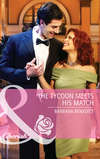Kitabı oku: «A Small-Town Homecoming», sayfa 3
CHAPTER THREE
QUINN EDGED his way through his apartment door that night with his arms full of breakfast supplies and a fast-food dinner. “Hi, Neva.”
“Here, let me take that.” Neva Yergin, his elderly neighbor and part-time sitter, shuffled toward him to take one of the sacks and set it on the narrow counter in his tiny kitchen. “You’re back earlier than I expected.”
“Hope I didn’t interrupt Trivia Maze.”
She shook her head. “Commercial break. But I’d better scoot next door before they start round two.”
“Okay.” He pulled the quart of milk and canned cat food she’d asked him to pick up for her from one of the sacks and set them aside. “How’s that disposal working?”
“Like a charm. Thanks again for fixing it.”
“No problem.”
Neva slipped her things into her bulging tote and headed toward the door. “She got home right on time. Been sitting at that computer all afternoon.”
Quinn stopped short of a sigh. He didn’t approve of Rosie’s method for shutting herself away, but he couldn’t ask Neva to drag his daughter out of her room and force her to find something better to do with her time. His neighbor was doing far too much for him already, more than he could repay with the rent he subsidized, or the occasional repair or sack of groceries.
“Thanks, Neva,” he said as the door closed behind her.
He moved into the cramped space that served as a combination living and dining room and switched off the television. The radiator rattled and wheezed and coughed up traces of mildew and aging plaster. Beyond the tall, grime-streaked window overlooking Third Street, a siren’s wail competed with the hum of passing traffic. Not the best place for raising a kid, but he’d had his own needs in mind when he’d signed the lease for an efficiency apartment two floors above the Karapoulis Travel Agency storefront.
And if they moved away, there’d be no Neva a few steps down the hall to keep an eye on Rosie after school. “Rosie,” he called.
No answer.
He set the bucket of chicken on the table and headed toward his daughter’s room, pausing in the doorway. “Rosie.”
“What do you want?” She sat slumped in her desk chair with her back to him, reading a note on her monitor screen.
“It’s time for dinner.”
“In a minute.”
“Now.”
The only part of her that moved was her finger on the mouse as she clicked to another screen.
“Rosie.”
“What?”
“You didn’t set the table.”
“I didn’t know what time you’d be home.”
“I’m home now.” He held his breath and grasped for patience, trying to avoid another fight. Another scene. There’d been far too many of both since her mother had dumped her on his doorstep. “And it’s time for dinner. Now.”
“Okay.” She clicked to a page with a picture of a wild-haired rock guitarist caught in the glare of a gigantic spotlight. A tidal wave of electronic noise flooded the room.
“Turn that off.” He stepped through the door. “It’ll still be there after you’ve eaten.”
“All right.” She blew out a martyred sigh and whirled in her chair to face him. “Chicken again?”
“Yeah.”
“Jeez.”
“We can go to the store this weekend. You can pick out some things you like to cook.”
“I’m not your slave.”
“No. You’re my daughter,” he said, feeling foolish for pointing out the obvious. “And I want you to come and eat your dinner.”
“I said all right.”
He slid his hands into his pockets and watched her, waiting, praying she’d give in and walk through the door, promising himself he wouldn’t move a muscle or say another word until she did. He searched her face—that long, pale face dusted with her mother’s freckles and framed with his own dark hair—looking for the sweet, cheerful little girl he’d known so long ago. But she wasn’t there.
“Are you just going to stand there all night?” she asked.
“No. Just until you come to dinner.”
She rolled her eyes and shoved to her feet. “Jeez.”
He followed her back to the kitchen, dreading the nightly routine. Questions about homework, answers he didn’t trust. Conversation conducted in monosyllables and resentment hanging so thick in the air it seasoned every bite of food he swallowed. An argument about the cell phone, or bedtime, or something she wanted to buy, or whether a ten-year-old needed a babysitter—any-thing but the one topic he knew she really wanted to fight over: her mother, and when she was coming back to rescue her.
At times, the pain was unbearable. He wanted to keep his daughter here, with him, wanted to get to know her again, wanted to break through the walls she threw up in his face, wanted his love to matter, to build solid memories for her to take with her when she’d grown and gone. He wanted to gather her close and hold her tight, to make her pain disappear, to feel her thin arms wrap around his neck and hug him tight, the way she’d hugged him so many years ago. A lifetime ago.
But he couldn’t take away her hurt, and he couldn’t offer the comfort she wanted right now. All he could do was reach deep, deep down below his murky emotions and haul up another handful of patience and love. And pour his invisible offering over the sad and sullen child whose stony expression reminded him of all his failures.
He asked her what she’d done at school that day, but she wasn’t talking to him tonight. So they sat in uneasy silence as they picked the meat from the bones.
TESS GLANCED up from her monitor two days later when the door to her office clicked open, admitting a gust of rain-specked wind and a dripping, frowning Quinn. He raked long, scarred fingers through his wet hair and ran an assessing look around her office.
“What are you doing here?” she asked.
“Is that how you greet all your customers?”
“Is that what you are?” she asked as she rose from her chair. “A customer?”
“What kind of customers do you get in here, anyway?” he asked as he stepped farther into the room. His gaze traveled over the sketches pinned to the wall, the fan suspended from the tin ceiling, to the models displayed on tall white cubes and the massive ficus arching over one corner of the red Persian rug on the old plank floor.
“The serious kind.” She folded her arms and waited as he leaned over a model of a tasting room she’d designed for a Paso Robles winery.
He straightened and met her stare with a particularly grave expression. “I’m serious.”
“Yes,” she said as her lips twitched to hide a grin. She wondered if she’d just witnessed a miserly sample of his sense of humor. “You are.”
“I like this.” He bent again to study the winery model. “It’s clean.”
“Clean?”
“Uncluttered. French without the frills.”
“The client asked for sleek and no-nonsense, with an Old-World feel.”
“You gave it to him.”
“Giving my clients what they ask for is what keeps me in business.”
“Even if you know better than they do what they should be asking for?”
“That’s where a touch of diplomacy comes in handy.” Tess tilted her head to one side, pleased with his subtle compliments but wondering what he wanted. He had to be working some angle, or he wouldn’t have spared the time to stop by. Everyone who knew him said he was a straightforward kind of guy. “It works wonders,” she said. “You might give it a try.”
“Waste of time.” He shoved his hands into his pockets and straightened again, facing her. “I want to change the approach to the parking area. Straight shot, northeast corner.”
“The curve from the street on the south will slow traffic and show the building to best advantage. I want visitors to savor their entry into the space.” Tess strode to the model set in the wide bay window and pointed to the overlapping layers representing the site grade. “A curving drive will give the landscape design team a more interesting flow to work with. And this bend in the road will be the perfect place for an ornamental tree.”
“We can get more parking spaces if we come in straight from the street.” He crossed the room to where she stood and sliced a finger across the softly cascading form. “Here.”
“We’ve already provided for the number of parking slots the city required.”
“There’s room for more.”
“No.”
He glanced at her. “Now might be a good time to try some of that diplomacy you mentioned.”
“I don’t have to be diplomatic about this.”
“You do if it’s not cost-effective.”
“Everything I’ve mentioned is in the budget.”
“About that budget.” He narrowed his eyes. “There’s no room for delays.”
“Yes, there is.”
“Not enough.”
Now it was her turn to aim a dark look in his direction. “Are you planning on inefficiency?”
“No. But weather happens. Shit happens. It always does.” He leaned toward her. “If you’d spent any time around a construction site, you’d know that.”
“I’ve spent plenty of time around construction sites,” she snapped, temper edging her closer to him, “and I’ve never had any problems with my budgets.”
“Because the contractor covered your butt?”
“Don’t worry, Quinn. You’re the last person I’d ask to cover any piece of my anatomy.”
Too late, she realized the direction the conversation had taken. So, obviously, did Quinn. His gaze dropped to her lips a fraction of an instant before hers dropped to his.
She watched, helplessly fascinated, as one corner of his mouth slowly turned up, deepening the groove in his cheek. Her breath snagged, and she was glad that was only half a smile. She had a feeling the complete version would be devastating.
“Are we going to be doing this every day for the next nine months?” she asked when she could suck in air again.
“Arguing?”
Arguing. That’s all he’d been doing. She turned and moved toward her desk to put some distance between them. And tossed her witchiest smile over her shoulder, just to get back at him. “What did you think I meant?”
“We only have to argue when you’re wrong,” he said, his serious expression back in place, “and too stubborn to admit it.”
“I’ve explained my reasons for keeping the plan the way it is.”
“Yeah. Got it. Stubborn.”
“It’s not stubborn. It’s better.”
“It’s more expensive.”
“But worth it. And it’s in the budget.”
He paused to study her, and she studied him right back, admiring the lean, rugged, oh-so-masculine shape filling out his rumpled jacket and weathered jeans.
“Straightening that drive would trim enough to cover a host of unforeseen delays and cost overruns.” He slid his hands back into his pockets. “In addition to providing more parking, which would make the customers happy and earn extra points with the city.”
“Very practical.”
“And hard to argue with.”
“Arguing’s rarely all that hard for me.” She settled in her chair. “I’m stubborn, remember?”
“Yeah. I remember.”
Those sky-blue eyes of his tracked her every move as she crossed her legs and smoothed her short, straight skirt. She swiveled to the left, and she swiveled to the right, giving him an interesting view, waiting for his next salvo.
“All right,” he said at last.
“All right?”
“Yeah.” He walked to her door. “All right.”
“That’s it?” She stood so quickly her chair bumped the backs of her knees. “You’re leaving?”
“I have a site to clear.”
“Oh. Well. All right, then.”
He grabbed the knob and then stilled, staring at her. “You sound disappointed.”
“I’m not.”
“Good. I wouldn’t want all my diplomacy to go to waste.”
“Is that what you were doing here, Quinn? Being diplomatic?”
“Yeah,” he said in his deadpan manner. “Couldn’t you tell?”
“Now there’s an interesting question.” She smiled and shifted her hip over the edge of her desk, enjoying the conversation—and the company—entirely too much. “With any number of equally interesting answers.”
“Seems to me all it needed was a yes or no.”
She tilted her head. “Or a maybe.”
“Like I said. Diplomacy is a waste of time.”
“Later, then.”
“Yeah.” The look he shot her arrowed a blast of heat right through to where it counted. “Later.”
GENEVA SETTLED into her favorite booth at the Crescent Inn on Friday after her morning water aerobics class and pulled a smooth linen napkin into her lap.
“The usual, Mrs. Chandler?” asked the waitress.
“Yes, thank you, Missy.” Geneva smiled at Gordon Talbot’s youngest daughter, amazed she was old enough to be working. Time seemed to pass so quickly these days.
These years.
“Hello, Geneva.”
Geneva glanced from her list of the day’s specials to see Howard Cobb, real estate developer and member of the city council, frowning at her. “Good afternoon, Howard.”
“I wondered if I’d find you here.”
“Are you stalking me?” She set her menu aside and gave him her blandest smile. “Should I be disturbed?”
His frown deepened. “Mind if I join you?”
“For lunch?” she asked with just a touch of dismay.
“For a moment. Or two.”
“Through the iced-tea course, then,” she said as Missy delivered her drink.
He settled heavily into the booth across from her, his oversize belly brushing against the table edge. “You know, there are plenty of folks around here who don’t look too kindly on Chandler money forcing things they don’t want down their throats.”
“What an unpleasant image, considering I was about to order my lunch.” She delicately dabbed her napkin to the side of her mouth. “I wonder how many of those same folks are cashing paychecks earned with jobs that Chandler money created for them.”
“There’s no question your husband and his father did some good things for this community.” Howard shifted forward as far as his paunch allowed. “But people who built businesses fifty or sixty years ago didn’t have the same kinds of concerns that people do today.”
“Are you talking about the businesses, or the building of them?”
“We both know what I’m talking about.”
She picked up her tea and sipped. “Then this will be a very short conversation.”
“You can’t get your way all the time, Geneva.”
“You’re right, of course, Howard,” she said with a thin smile. “I’d be a fool to expect that. And I’m not a fool.”
“That’s right. That’s why you should seriously consider backing off this Tidewaters project while there’s still time. It’s the right thing to do, and you know it.”
“If I thought it was the right thing to do, I would have quit before I started. And certainly before investing so much Chandler money in the development phase.”
For months she’d poured funds into the pockets of marine biologists, geologists and engineers. She’d battled federal agencies, the state’s coastal concerns, the city’s commissions and committees and codes and several local environmental activist groups. But for too many environmentalists, the objective scientific evidence didn’t outweigh their emotions. And for too many politicians, the promise of community benefits didn’t compensate for the possible loss of their constituents’ support.
Cobb’s complexion darkened. “The harm this project will cause to the environment will far outweigh any possible economic benefits.”
“That’s a strange comment, even for you.” Geneva took another sip of her tea. “And particularly strange considering that the environmental impact report and the city’s financial analysis indicate precisely the opposite.”
“Studies bought and paid for,” Howard said as he stabbed a beefy finger at the table. “By you.”
“Which doesn’t make them wrong. Merely purchased. Another part of the cost benefit noted in that financial analysis.”
“Some folks might say that smacks of corruption.”
“And some might wonder about the conflict of interest for a city councilman who is involved in the construction of a similar commercial building in a different part of town. A building that may soon be in competition with mine for tenants.”
Missy hovered near the table, her order pad in her hand. Howard glared at Geneva as he pushed to the side and exited the booth. “This isn’t over.”
“Oh, I think it will be, in about nine months,” Geneva said pleasantly. “When Tidewaters opens its doors amid a buzz of community curiosity and to the delight of its retail tenants. Tenants who may prefer waterfront views and the benefits of tourist foot traffic.”
“We’ll see about that.” He turned and stalked out of the inn, dropping a few bills on his table as he passed it.
“Nasty man,” whispered Missy.
“But a good tipper, from the looks of it,” Geneva said. “I’m sure he means well.”
“Everyone means well when they’re trying to get their way.”
“Why, Missy,” Geneva said as she raised her glass, “may I quote you on that?”
“Only if it’s off the record.” The waitress shook her head. “I don’t want any of that guilty-by-association stuff.”
Geneva sipped her tea in silence, feeling wonderfully guilt-free. It seemed there were, after all, a few benefits to having time pass so quickly.
CHAPTER FOUR
QUINN WAS in a foul mood on Monday morning as he headed toward the Tidewaters site. An early-morning conference with Rosie’s teacher had left him frazzled and frustrated and a bit shaky. Mrs. Thao had told him his daughter wasn’t working up to her potential. When he’d examined samples of Rosie’s classwork, he’d discovered she wasn’t working much at all. Half-finished math papers, half-assed compositions.
Turning down Front Street, he muttered a curse. He could check her homework for completion; he couldn’t monitor what she did in the classroom. And he couldn’t expect Mrs. Thao to fuss over Rosie, one-on-one. Rosie would have to quit her game of slow-motion sabotage or risk failing the year. He’d have to lay down the law, arrange to check in with her teacher on a regular basis, show his daughter he could be damn stubborn when it came to succeeding at something that mattered.
Just what they both needed: more tension at home.
He’d hoped Rosie would have begun to settle down, to resign herself to the situation and the fact she’d be staying with him for a while. Quite a while, if he could make it stick. But it seemed she’d decided to shut down in addition to shutting him out. And he didn’t know how to reach her.
Maybe he needed some help. Maybe that was what they both needed.
Too bad the idea tangled his gut and yanked on the knots. His morning coffee nearly bored a hole in his stomach lining at the thought of seeing a counselor. Rosie might shift tactics to open rebellion. Nancy would probably use it as a weapon in a custody battle. And he damn well didn’t want to dredge up all the bitter mistakes of his own past, just when he was able to focus on the future.
He swung into the job site, ready to sweep aside the mess of his personal life and concentrate on work he knew how to do, with tools he knew how to wield. Ready to make tangible progress to offset his failures.
He expected to see Rusty, one of his crew members, digging footings with Quinn Construction’s brand-new backhoe while Trap and Wylie Lundgren cleared the rest of the site with their excavating equipment. Instead, he saw the Lundgrens standing with his own men near the backhoe. Rusty trudged toward Quinn’s truck, a frown on his face and worry in his eyes.
With another muttered curse, Quinn grabbed his tool belt and hard hat, stepped out and slammed the truck door. “Problem?”
Rusty’s cheek bulged as he shifted his habitual wad of gum. “Yep. With the backhoe.”
“What kind of problem?”
“Best have a look for yourself.”
Quinn followed him toward the equipment, nodding at the wiry, grizzled Lundgren brothers as he passed. “Morning, Trap. Wylie.”
Trap answered with a scowl. “Too bad it’s such a pisser.”
Quinn strapped on his belt and stared at the men loitering around the equipment, wasting valuable time. “What’s going on here?”
“Take a look,” Rusty said again.
Quinn leaned in to peer at the engine. Grains of sand lay scattered over the engine block. “What the hell?”
“It seized up a few seconds after I switched on the ignition. Figure the bastard poured sand in the oil filter.” Easygoing Rusty had murder in his eyes. “He didn’t have to look too far. We’re standing in a yard full of the stuff.”
Sand in the oil filter meant sand spreading through the engine—scoring the pistons, ruining the chambers and turning the entire engine into a worthless hunk of metal.
An expensive hunk of metal. Quinn began running the figures in his head, estimating the costs of delays on the site, the time lost on paperwork and the added expense of a rental to replace this piece. The long-range damage to his insurance rates. Fury surged through him as he slowly straightened and scanned the rest of the equipment on the site. “Anything else wrecked?”
“Nope.” Wylie lifted the rim of his gimme cap to scratch at his forehead with grimy fingers. “Everything else seems okay. And we aim to keep it that way.”
“What does that mean?”
“Means we’re going to be trailering our equipment off-site every evening. We can’t afford to lose one of our machines to some crazy dude who thinks dumping sand in an engine is an evening’s entertainment.”
Trailering fees hadn’t been included in the Lund-grens’ subcontracting bid for the excavations. Quinn figured they’d tack on the added expense when they sent the bill. He nodded, his gut on fire as he took another hit. “All right, then.”
He glanced at the operators. “Let’s get going here. Rusty, Jim, get a cable hooked to the backhoe and haul it up on that trailer. I want the rest of the building site cleared for the footings by the end of the day.”
He waited while Trap and Wylie moved off to their excavator and bulldozer and the rest of the men got back to work. And then he trudged over to his office trailer, jogged up the steps and shut the door behind him. He pulled his cell phone from a pocket and paused, pinching the bridge of his nose. A headache was coming on, riding a wave of anxiety.
And then the dark, seductive need flowed in beneath it, urging him to walk out of his office, climb into his pickup, drive away from his troubles and find a few moments of peace. His crew could take it from here. Wylie and Trap—they knew what to do. Hell, what if he’d phoned in sick? The work would still get done. Time to himself, that’s all he needed. No one would know or care if he took a drink to settle his nerves. Just one. One hour, one drink.
A bead of sweat trickled down his spine as he battled away the demons buzzing inside. Steady, steady. Breathe. Think.
Damn, damn, damn.
He stared at the phone lying like a lump of lead in his palm, struggling for the strength to make a call. The crisis passed, and he slumped against the counter, feeling bruised and sour and old as dust. He willed himself to concentrate on the job, to plan for some action that would drag him back into the real world, the world outside his shaky, hollow being.
Wylie’s bulldozer rumbled past the office, vibrating the thin metal walls and sloshing the cold coffee in the mug beside Quinn’s elbow. The familiar odors of diesel exhaust and fresh-turned clay floated through the air, and the productive clang and roar of the excavator hung in the background. He needed to call the police—yes, call and file a report about what had happened here this morning. But before he made that call, there was someone else who had to be notified. Someone who could help clear his mind and get him on track again, to do what he needed to do today.
He took another deep breath and punched in a number from memory. “Geneva,” he said when she picked up. “It’s Quinn. Sorry to be calling so early.”
AFTER MEETING Addie at her shop to discuss wedding-shower plans over takeout salads, Tess hadn’t planned on extending her lunch break in Dee Ketchum’s Pink Boutique. But she’d paused to drool over the cutest pair of shell-studded flip-flops arranged in Dee’s shop window. And after she’d spied a vintage-style purse with shimmering beads fanning in the colors of a peacock’s tail, she hadn’t been able to resist stepping in to peek at the price tag. And once she’d walked into the tiny store, she’d decided she might as well take a few minutes to check out the other tempting items Dee might have tucked inside her treasure-box store.
And wasn’t it a good thing she’d taken the time to drape that gauzy, cherry-dotted scarf over the black boat-neck sweater she was carrying to the dressing room? She might not have overheard Celia Kulstad telling Dee about the patrol car she’d seen parked at the Tidewaters site that morning.
Now Tess was speeding toward the waterfront, her cell phone to her ear, waiting for Geneva to pick up. She braked and skidded to a stop, clicking her nails on the steering wheel as Crazy Ed lumbered across the street, headed to the marina. He waved and gave her a gap-toothed grin, and she waggled her fingers in response. “Get a move on, Eddie boy,” she said. “I’m in a hurry here.”
When she got Geneva’s voice mail, she tossed the phone into her purse, her irritation growing. She’d rather talk with Grandmère about this in person, anyway. Later, when her temper had eased a bit. Or when it had ratcheted higher, if she discovered Quinn had handed her a reason to give him some grief.
A few moments later she jerked to a stop at the edge of the site and stepped from her car. Trap Hunter’s excavating equipment chugged and roared and clawed at the ground, tearing through the reddish-brown earth with steel talons. Beyond the ragged ditches of the footings, one of Quinn’s crew—Ned Landreau, she thought—nudged an elbow into Quinn’s ribs as he leaned to gaze through a laser level.
Quinn straightened and waited, his pose casual and his expression grim as Tess picked her way across yards of tracked-up, clodding earth. Her heels sank into the pungent soil, coating her navy slingbacks with grime, and she cursed him with every shoe-sucking step.
Especially since the way Quinn looked, with his muscular form outlined by the fabric of his chambray shirt and his tool belt slung low over one jean-clad hip, nearly made her mouth go dry.
“Glad you could make it,” he said after she’d de-toured around the deep gash of the western footing. “But you might want to rethink your choice of outfits if you’re going to make a habit of dropping by. Things can get pretty messy around a construction site.”
She swiped a speck of mud from her pencil-slim skirt and tugged at her coordinating shantung-silk jacket. “I wasn’t planning on stopping by. I heard the police were here this morning. And I’ve been around plenty of construction sites.”
“Good. Then I won’t have to remind you to bring a hard hat. I don’t have one to spare.” He turned back to his level, squinted into the scope and gestured to a crew member holding a marker near a footing.
She took another careful step closer. “Why was a patrol car here?”
“Because I called to file a report.”
“About what?”
“Vandalism.”
“What?”
He paused and leisurely added a note to his clipboard, but the ripple of muscle along the edge of his jaw betrayed the effort he was making to control his anger. “Someone poured some sand in an oil filter.”
“That sounds serious.”
He flicked a frigid glance in her direction. “It is.”
“What do you intend to do about it?”
“Rent another backhoe until I can get mine fixed.”
“I mean,” she said as she folded her arms across her chest, “what are you going to do about getting better security so this kind of thing won’t happen again?”
“What do you mean, security?” He shifted closer and angled his head toward hers. “Are you suggesting I hire a guard?”
She held her ground, though she could nearly feel the temper and heat pumping off him. “Pouring sand in an engine is a lot more serious than the typical mischief at a site like this. Things like graffiti or materials theft.”
“I know what goes on at sites like this.”
“It could happen again.”
“I know that, too.”
“Tell me,” she said sweetly, “is there anything you don’t know?”
The corners of his mouth turned up in an unfriendly grin, and his gaze roamed over her features. “Plenty. Particularly about female architects.”
“If I were you,” she said, recklessly following the shift in the argument, “I’d be in a big hurry to figure things out.”
His eyes darkened. “What makes you think I’m not?”
He bent again at the waist and squinted into the scope. Tess was proud of herself for not noticing the way the back of his jeans curved behind his tool belt.
“Look, Quinn, I—”
“If you don’t think I can handle this job, well, you’re entitled to your opinion.” He made an adjustment to the level and checked the scope again. “But you’re not the one who hired me to do it. And the woman who did hire me wants us to work together.”
“Believe me, I’m aware of that.”
“So work with me.”
He shot one of his penetrating looks at her, the one that made her feel as though he could see deep inside her to that place where she hid all her doubts and insecurities. She detested that look, nearly as much as she detested the fact that he was right. She had to work with him.
“Fine,” she said. “I’ll work with you. And I’ll expect the same. A phone call when there’s something—anything—to report.”
He nodded solemnly. “You got it.”
“Now, about the security—”
“Already taken care of.” He called another instruction to the man with the marker. “I discussed it with Geneva.”
His words stung like a slap. Tess tried not to show it, to keep her eyes on his, but she knew from the way his frown deepened that he’d noted her flinch.
“Well,” she said when she’d recovered, “now you can discuss it with me.”
“Look, Tess, this isn’t—”
“Later. At my office. Five o’clock.” She turned on her soggy, muddy heel and walked away.
STILL in a temper a quarter of an hour later, Tess shoved her way into her office and then swore when her Macho-Mex mocha sloshed over the edge of the cup. Chocolate spatters layered over the dusty red splotches on her slingbacks. “Aww, for cryin’ out—”
Ücretsiz ön izlemeyi tamamladınız.












